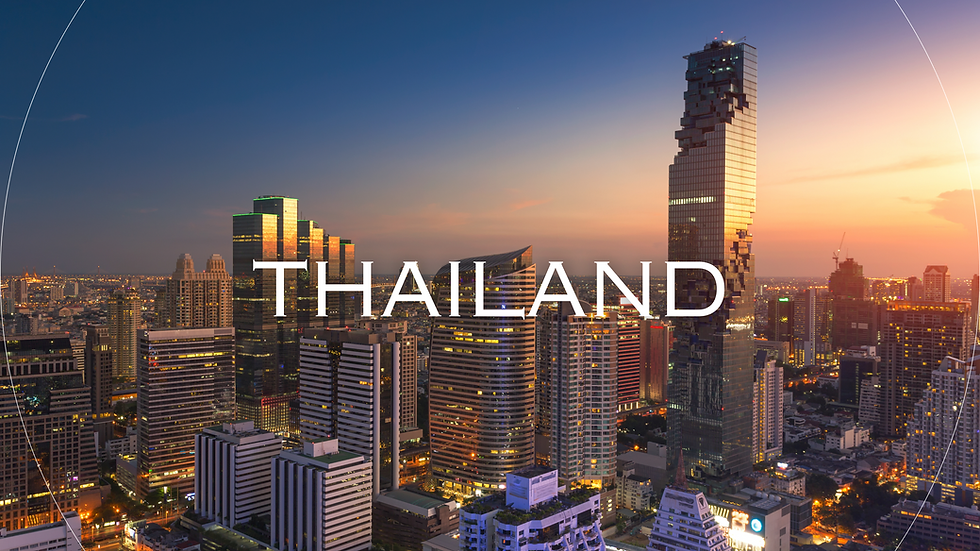Country Profile: Thailand
- Enterprise Thailand
- Oct 26, 2023
- 3 min read

Background Information
Thailand, situated in South-East Asia and covering approximately 513,000 square kilometers, boasts a population of 71.6 million. It stands out as one of the most homogenous nations in the South-East Asian region, with a mix of various ethnicities. In terms of population, Thailand ranks as the fourth-largest state in South-East Asia. Bangkok, also known as Krung Thep (City of Angels) in Thai, has served as the capital. In recent years, Bangkok has experienced rapid growth, with a rising percentage of urban residents in Thailand. The official population of Bangkok is reported to be 10.72 million, making it the predominant urban area in Thailand. Notably, Bangkok is home to nearly all major domestic and foreign corporations, government ministries, and most of the country's leading educational and medical institutions, as well as a rich array of sporting and cultural activities.
Politics
In recent years, Thai politics has witnessed a significant struggle between the conservative, junta-led faction and the progressive pro-democracy camp. This conflict has escalated since the 2014 coup and recently peaked after the latest election in May 2023. The victory of the Move Forward Party added to the political tension due to the “ultra-democratic” movement, marking the start of policy-driven politics. Amidst the tension and political speculations, the Former PM Thaksin-backed Pheu Thai Party settled to form an unexpected coalition government with unlikely allies, the Junta-led parties retracting the coalition with the Move Forward Party. This alliance raised questions about the effectiveness of the new government in forming effective public policies. With the election of Srettha Thavisin, a former real estate tycoon, as the new prime minister, Thailand's politics is projected to perform on par with the junta-led government at worst and push exceptional investment and trade growth at best, with a lower risk of political unrest, political reform, and military coup.
Economy
Thailand's economy is anticipated to rebound to pre-pandemic levels, albeit with a more gradual growth rate forecasted for 2023 due to global uncertainties. Despite the crisis, Thailand's fiscal response has softened the impact on Thai households. Thailand also maintains a robust financial system and institutions, maintaining price stability, economic growth, and financial system stability. The Bank of Thailand (BOT) has committed to keeping inflation in check. The BOT projects the headline inflation to be 2.5 and 2.4 percent, while the core inflation is projected at an elevated level of 2.0 percent in 2023 and 2024. The baht exchange rate against the US dollar has stabilized at the range of 29 and 38 baht per US dollar for the decade.
In recent developments, the Thai government introduced comprehensive tax incentives and policy adjustments to promote foreign investment and create an attractive investment climate through 100% foreign ownership, removal of local content requirements, no export mandates, unrestricted use of foreign currency, import exemptions, corporate income tax reductions, double deductions for utilities, and infrastructure cost deductions, the facilitation of land ownership rights and streamlined work permit and visa processes.
With optimistic future projections, Thailand is prime for engagement in the new frontier market of Africa. Thailand's engagement with Africa is focused on fostering a mutually beneficial exchange of knowledge and experience. The bilateral initiative is designed for various sectors to strengthen and expand their trade, investment, and interpersonal connections. This initiative signifies a commitment to enhancing cooperation and advancing economic, social, and diplomatic ties between Thailand and African countries.
By Mr.Sarawut Thiramanit, Dr. Prachaya Suwanhirunkul
Enterprise Thailand
.png)



Comments